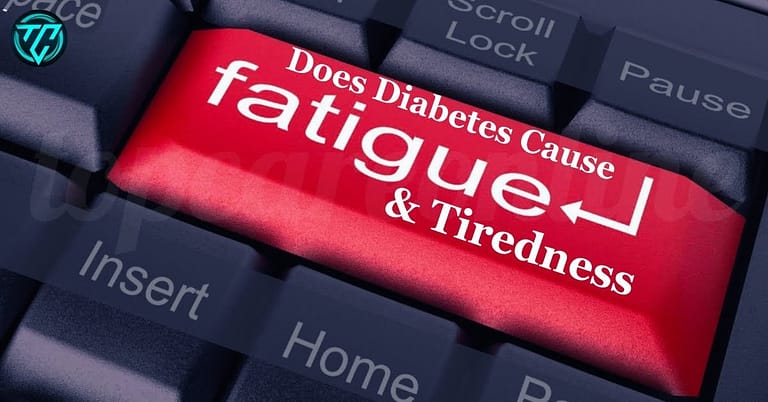Why does diabetes make you feel so exhausted?
If you’re living with diabetes, you’re likely familiar with the overwhelming sense of tiredness that seems to strike without warning. But have you ever wondered Does Diabetes Cause Fatigue and Tiredness?
Whether it’s extreme fatigue after eating sugar or simply feeling drained throughout the day, managing your energy can be a constant battle.
Understanding Fatigue in Diabetes
Fatigue is more than just feeling tired after a long day; it’s a persistent sense of exhaustion that can interfere with daily life. For people with diabetes, fatigue can arise from various factors:
Blood Sugar Levels:
- High Blood Sugar (Hyperglycemia): When blood sugar levels are elevated, the body struggles to use glucose for energy. Instead, it starts breaking down fat for fuel, which can lead to feelings of tiredness.
- Low Blood Sugar (Hypoglycemia): On the flip side, when blood sugar drops too low, it can cause symptoms like weakness, dizziness, and extreme fatigue. This is particularly common if you’re on insulin or certain diabetes medications.
Dehydration: High blood sugar can lead to increased urination, which can result in dehydration. Dehydration often leads to fatigue, making it harder to stay energized throughout the day.
Sleep Disturbances: Many people with diabetes experience sleep issues, including sleep apnea, which can significantly impact energy levels. Poor sleep quality often translates to daytime fatigue.
Emotional Factors: The stress and anxiety of managing a chronic condition like diabetes can also contribute to feelings of tiredness. Mental fatigue can be just as debilitating as physical fatigue.
Infections and Illness: Diabetes can make you more susceptible to infections, which can sap your energy. Even minor illnesses can leave you feeling more fatigued than usual.
Does Diabetes Cause Fatigue and Tiredness?
Fatigue is a common problem many people experience, but when you have diabetes, it can feel more intense and persistent. You might wonder, “Does diabetes cause fatigue and tiredness?” The short answer is yes, diabetes can indeed cause fatigue, but the reasons are more complex than you might think.
Can Diabetes Cause Fatigue
- Blood Sugar Fluctuations
When you have diabetes, managing blood sugar levels is a constant challenge. If your blood sugar is too high (hyperglycemia) or too low (hypoglycemia), your body struggles to function properly, leaving you feeling drained. Both of these conditions can lead to fatigue, as your body either lacks energy or is using energy inefficiently. - Insulin Resistance
For individuals with Type 2 diabetes, insulin resistance is a major factor. Insulin resistance means your body’s cells can’t effectively use insulin to convert glucose into energy. As a result, your body’s cells are starved for energy, leading to constant tiredness. This can be frustrating because even if you’re eating enough food, your body isn’t getting the energy it needs. - Diabetes Complications and Fatigue
Diabetes can lead to other health complications that may cause or worsen fatigue, such as:- Kidney disease (diabetic nephropathy), which can result in anemia and low energy.
- Heart disease, which can decrease your stamina and make even simple tasks feel exhausting.
- Sleep apnea, a condition common in people with Type 2 diabetes, which interrupts sleep and causes chronic tiredness.
- Depression and stress, which are also more common in people with diabetes and can lead to mental and physical fatigue.
- Dehydration
High blood sugar can make you urinate more frequently, leading to dehydration. Dehydration further contributes to fatigue by affecting your body’s ability to function efficiently.
How to Manage Diabetes-Related Fatigue
- Monitor Blood Sugar Levels
One of the most effective ways to reduce diabetes-related fatigue is by closely monitoring your blood sugar levels. Keeping them within your target range can prevent the highs and lows that lead to exhaustion. - Healthy Eating
Your diet plays a huge role in how you feel. Focus on a balanced diet with plenty of whole grains, lean proteins, healthy fats, and non-starchy vegetables. Foods with a low glycemic index can help maintain stable blood sugar levels, preventing the energy crashes that come with high-carb or sugary foods. - Regular Exercise
Exercise can be a great way to boost your energy. Physical activity helps your body use insulin more effectively, improves circulation, and releases endorphins, which naturally improve your mood. Even moderate activities like walking or yoga can help fight fatigue. - Stay Hydrated
Since dehydration can exacerbate tiredness, it’s essential to drink plenty of water throughout the day. Avoid sugary drinks, which can cause blood sugar spikes, leaving you even more tired after the initial energy boost. - Get Quality Sleep
Sleep is essential for everyone, but especially for those managing diabetes. Practice good sleep hygiene, like going to bed at the same time each night and ensuring your sleep environment is comfortable and quiet. If you suspect sleep apnea, consult your doctor for a proper diagnosis and treatment. - Manage Stress
Chronic stress can wear you out physically and mentally. Stress also raises your blood sugar levels, which can worsen fatigue. Engage in stress-reducing activities like meditation, deep breathing exercises, or spending time with loved ones.
When to See a Doctor
If you’re doing everything right but still feel fatigued, it’s crucial to consult your healthcare provider. Persistent tiredness could indicate other underlying conditions like anemia, thyroid problems, or depression. Your doctor can conduct tests to rule out these issues and help you find effective treatment options.
Encouragement to Take Action
Take charge of your diabetes management today by making small but impactful changes in your daily routine. Regular monitoring, proper diet, and exercise can go a long way in fighting fatigue. Work with your healthcare team to find the best strategies to keep your energy high and your diabetes under control.
If you’re struggling with constant tiredness, don’t hesitate to talk to your doctor. There are strategies to help you regain control and live a more energetic life.

